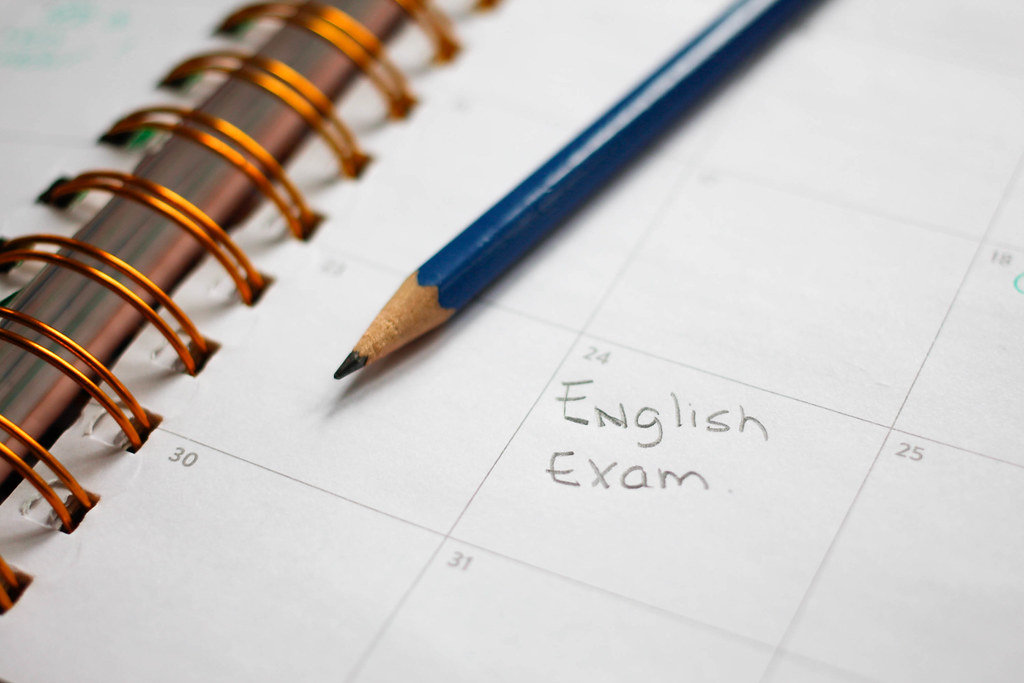Reading time: 4 minutes

LIFE STORIES After my last day of school, a stressful period of preparation for school leaving examinations began. My study plan didn’t work out and the exams themselves were rather surprising. Here you can get an insight into my everyday life during two exciting weeks.
Click here to get to the beginning of the story.
I started my actual examination preparation right after the last day of school with a study plan. I had six days left until the German exam, then two days before Physics and Maths and another two until English. That made – my head was rattling – two and a half days of learning for German, three for physics, two and a half for maths and two for English.
No epic, please!

I started with German on Saturday, concentrating on 3 of the 4 examination topics: I could do poetry in my sleep, written discussions were okay and material-based writing was more or less what I was doing all the time for this blog. Epic, on the other hand, I threw out. I had never written an epic essay in the sixth form (thank Corona); besides, I didn’t want to repeat all the small forms, read books and narrative techniques again.
I half-heartedly wrote a sample discussion, looked at old papers and made notes from my textbook on basic knowledge of language, media and reading. I wasn’t quite motivated enough to memorise the literary epochs, so I decided to just write an article about them, which ended up helping me – and many others, I heard – a lot. (The whole article can be found here.)
4 centuries of physics in two days
On Monday, I got up as early as 7 am to stay in the examination sleep rhythm and get as much physics done as possible before noon. But I didn’t really make much progress – at least that’s how it felt. I read through binder summaries, calculated old exercises and repeated the material I had studied. With motivational aids like chocolate and gum drops, I had the majority of the mechanics behind me after an arduous 3.5 hours.

After lunch, it was a 25-minute drive to Wittenberg, where 60 minutes of physics awaited me. Or rather, our physics teacher had set up an experiment for us in preparation for the examination, which we hadn’t been able to do in class because of Corona. Back home, I sat over my notes for another three hours.
How could I manage to repeat all the maths and physics of the last two years in such a short time? This thought circled inexorably in my head. But no, I was not allowed to think like that. I had already summarised the most important topics of physics within the last few weeks in a 22-page overview. And in maths, we had already worked through all the possible examination problems of the last few years in class. I was well versed in the topics and would manage to brush up on everything again before the examinations.
On Tuesday, I had the idea of checking the syllabus to see what had been covered in the basic physics course (yes, I wrote my paper at the basic requirement level, although I had taken the advanced course). I was shocked to discover that I could cross off whole subject areas from my knowledge. Astrophysics of all things, my favourite subject! Well, at least this meant less work for me and I managed to finish my physics studies by the evening with a few extra hours.
4 hours of analysis too much
I had planned a lot for maths. In two and a half days, I wanted to repeat all the topics from scratch and calculate the most common types of problems. Day 1 went differently than planned. The whole day I just sat over analysis (one of the three major subject areas of mathematics). At lunchtime, limits, extremal problems and curve discussions danced through my head. I allowed myself a 3-hour break, which turned into 3.5 hours because the weather outside was so nice.

In the afternoon, after I’d got through the tasks of the preliminary paper, I actually found the area quite cool (I never liked analysis), but my head was buzzing with x and e values. 6 hours of analysis in one day is 4 hours too much!
I got through Analytical Geometry on Thursday and repeated everything important for the German examination. Maybe I should have taken more time for German than just the evening, because I quickly found myself in a whirlpool between my own overviews and numerous YouTube videos that suddenly wanted to explain to me about some important topic for the exam. And again the thought crossed my mind that maybe I should have started studying even earlier.
It’s getting serious
Finally, on Friday, my first written examination took place. Naturally, I was quite excited and arrived at the room extra early. I conscientiously put all my exam equipment on the table: writing materials, food and drink, sweets and my little lucky pig. When it came to filling in the paperwork, the invigilating teacher suddenly said, “But you know all this already. This is surely not your first examination. Or is German someone’s first subject?” Half the class spoke up. “Oh, all the science students. You’ll be running at full speed next week.” Oh dear, don’t remind me!, was all I thought to myself.

But I could worry about maths and physics later. First it was a matter of waiting twenty minutes for the A-levels. Delayed, the selection period began. I didn’t even read through the epic text. So I had to choose between a poem by Schiller from the Classics, a discussion text about language varieties and the material-based slice of an informative text about media. The material for the latter option went on for 6 pages, which I didn’t want to do to myself, and the poem by Schiller sounded as if the poet had long since gone to heaven. Without further ado, I decided to pick the written discussion.
Since we had 30 minutes more time than normal due to Corona, I didn’t stress and calmly went through my individual steps. The analysis of the factual text (which would make up 60% of the grade) suited me well. In the discussion part, on the other hand, I had my problems giving a meaningful structure to all the information I had learned on this topic. When the working time was finally over far too quickly, I had written (something like) 2268 words and was just relieved to have the examnation behind me.
What you can’t do by then, you won’t learn any more
Although my physics teacher had told me to put my feet up for the weekend (“what you can’t do by then, you won’t learn any more”), I had made up my mind to do physics again for the rest of Friday. Here, too, I painstakingly worked my way through all sorts of YouTube videos. Saturday – my last day of physics practice – arrived and I was pleased to find that shortly after lunch I had already done everything I had set out to do.

There was some free time before I went back to my 41-page maths overview (which I had made since the beginning of the sixth form) to repeat analysis and analytical geometry again. I was pretty tired when I started repeating stochastics on Sunday. But what had to be, had to be. In just one week, all this would be over.
Monday morning. I was even more excited than before the German examinations. Since only 9 people were taking their examinations in this subject at all, we all fitted into one room and our headmistress personally brought the envelopes with the assignments. After a glance at the students, she said with a smile to my best friend and me (we were the only girls in the room) that it was always nice to meet girls in subjects like physics. Then the examination started. I took a deep breath. “Oh, Maja, we’re writing a basic course. We’ll manage. What could go wrong?” I could still hear the words of a classmate in my ear when I finally turned over the worksheets.
An x2 diagram
At first glance, the tasks of G1 seemed more difficult than those of G2 (by G1 and G2 I mean the two basic topics we could choose between). But I knew: G2 always contained an experiment. And what an experiment the authors had come up with! Mechanics, throws and friction … And then you were supposed to draw an x2 diagram? (I had never seen anything like that before.) I quickly flipped back to G1 and, with some thought, got through the tasks surprisingly well.

Meanwhile, an amazing number of people had chosen G2 and the experiment and were now being led one by one to another room to do the experiment. This was surprising because most of the students had previously said: I’ll never take the experiment! Well, sometimes life works out differently than expected.
The in-depth topics V1, V2 and V3 (here, too, one had to be chosen) turned out to be even stranger than G1 and G2. V1 talked about alternating current circuits (quickly turn the page!), in V2 you were supposed to write an essay (!) about the Lorentz force* and in V3 I had absolutely no idea about the components of the earth’s magnetic field. I found it difficult to decide and switched back and forth between the V topics several times. I was not the only one: other students also asked in between if they could change the topic again. Yes, they could, they just missed the lost time.
I myself ended up stuck with V2, the essay that our physics teacher had actually advised us not to do. But here at least I was able to bring in some learning knowledge and secure a few points. I left the examination room after 270 minutes with mixed feelings. I didn’t study much more for maths that day. After I had looked at my little study notes with some formulas and calculation rules (affectionately called “spickers” by me), I tried to sort out my thoughts a bit and relax. But I only succeeded semi-successfully.
* For those who are interested: The Lorentz force is the force acting on moving charge carriers (e.g. electrons) in magnetic fields.
Missing exam papers
As expected, my tension before the written Abitur examination in the advanced mathematics course was even greater than before physics. Maths had always held a certain appeal for me because it was so simply structured and yet so complex. You could know everything and shine, or you could black out and know nothing at all. I hoped for the former. The fact that our maths teacher mentioned how proud he was that so many of his class were taking maths in the advanced course made me start the examination with a good feeling.

First, however, we had to find out where the examination papers from first part of the exam had gone. They had mysteriously disappeared. It took about 15 minutes until it turned out that a basic course had received our papers instead of theirs.
Finally, we started. When I read through the assignments for the first time, I started to get scared. What were all these assignments about? I did what I always did in such situations. Taking enough time, skipping tasks, thinking around the corner. And indeed, with each passing minute, more and more of the hundred questions in my head simply vanished into thin air.
After 100 minutes, part two of the examination began, and I was slain by a plethora of at least 20 tasks. But at first it went quite well. The tasks were strange, but they were easy to solve. Only the stochastics, where we could choose between two topics, gave me a bit of a headache. Again and again, while solving the problems, I thought I would have been better off choosing the other topic, but the time was too far advanced by now to switch. So I struggled through the tasks halfway successfully until the time ran out and I had to realise: Mmh, that was probably nothing with stochastics …
Where was the examination room?
I couldn’t see any numbers for the rest of Tuesday. Torn, I thought about whether I should start studying today for English in 3 days. But what was there to learn in English? Finally, I came to a compromise and made an overview of the topics, methods and vocabulary I would study.

The very next morning, I began to regret not having started earlier. As during the whole examination preparation, I had the feeling that I needed more time, because I could still look at this and still learn that … Yes, I stressed myself out. But that didn’t get me anywhere. Several times I read through all the possible methods and linguistic means – which I had of course summarised again on an overview. Videos on YouTube helped me to repeat the most important topics. I had even found a free listening quiz on the Internet. That was all I could do.
On my last exam day, I got up earlier than usual. A tightening of hygiene rules had necessitated a quick corona test before the exam if you wanted to take off your mask during the examination. As always, I had to smile at the ingenuity of the manufacturers in designing rapid tests. Instead of the normal test strip, we were now given a small booklet that was both a guide and a test strip, and when folded up – with the test tube stuck in the middle – looked like an overgrown lollipop.
Nevertheless, the time until the examination started was getting long and my tension was rising by the minute. In addition, we had to find the right examination room, because the door to the room that was originally planned was locked. When we finally arrived in the room (a teacher had been able to help us), our English teacher surprised us with “little survival packs”. These turned out to be very practical indeed – filled with chocolate, an eraser and handkerchiefs.
A new chapter
After a 10-minute reading-in period, the English examination began with the 30-minute listening section. But while the first audio file was still easy to understand, in the following tasks the speakers got faster and faster and the time to fill in the questions got shorter and shorter. Overwhelmed as I was, I tried to write down the most likely solution everywhere. The result of the work will show whether I succeeded.
The other two parts, the writing part with integrated reading comprehension and the mediation part, were easier to manage, to my relief. I quickly decided on one of the texts to choose from and started solving the tasks. I wrote less than usual, but paid close attention to my language. The plan worked and when the first classmates handed in their work 30 minutes before the end, I was also almost finished.
I was one of the last to leave the examination room 20 minutes later and stepped outside. No, I still hadn’t realised that I wouldn’t see school again so soon. That what had occupied me for most of the day for 12 years would be over so suddenly. I was still clinging to the pending oral examination in a few weeks. For that, I had to repeat all the topics of the subject ethics of the last 2 years.

You can find out how my exam results turned out and how I prepared for my oral examination by following this link.

